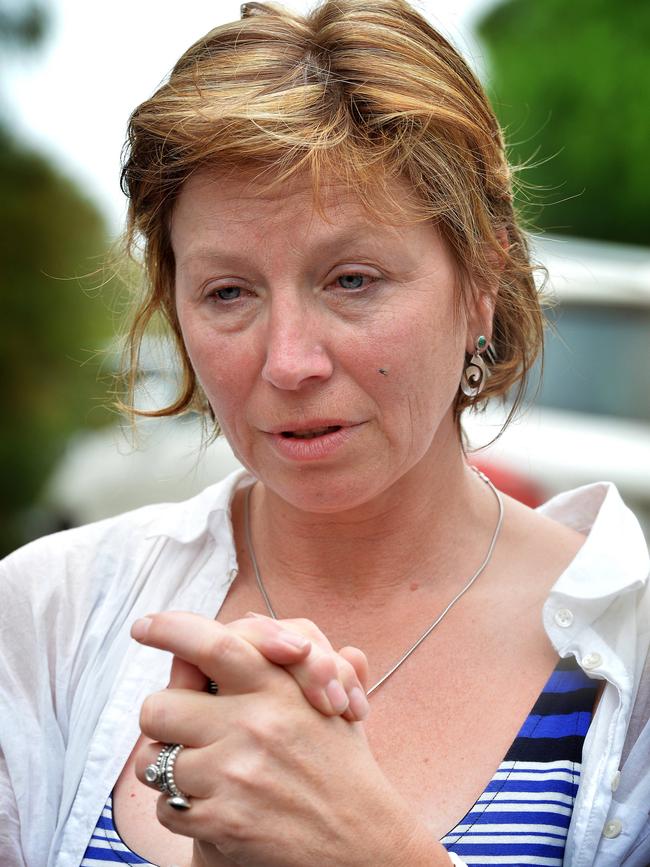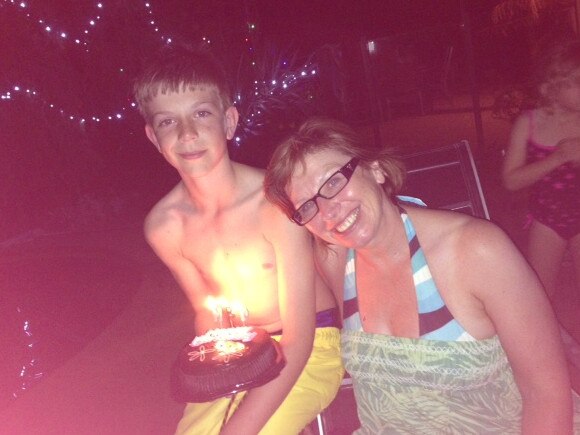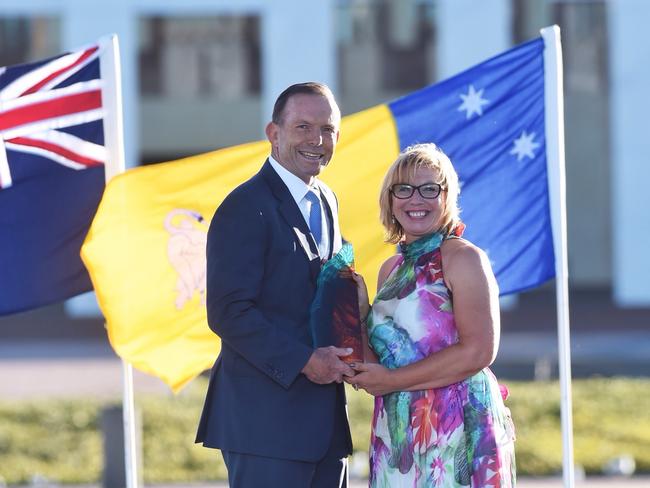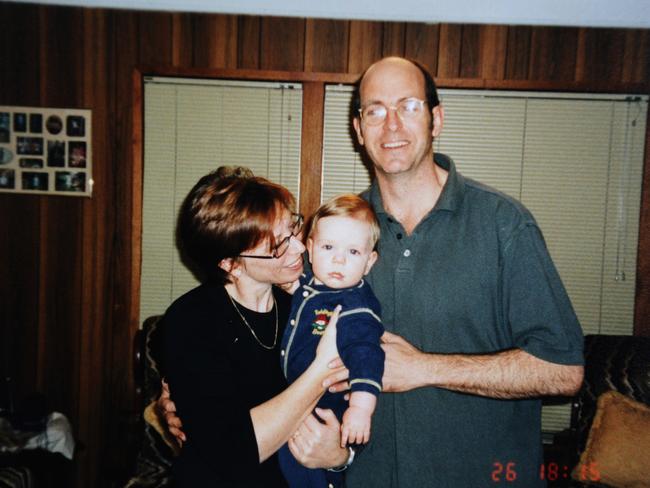Rosie Batty: ‘Happy times are more often than sad times now’
Rosie Batty became the face of family violence when her son was murdered seven years ago. Now out of the spotlight, home alone, a childless mother wonders what she’ll do with the rest of her life.

The rest of Rosie Batty’s life has multiple chapters. The first began in the most traumatic way on an otherwise ordinary day in early 2014. Her only child, Luke, an effervescent 11-year-old, was at cricket practice when he was killed in front of her by his father. It was a brutal, unfathomable act, carried out amidst children playing sport on a summer’s day, and it shocked a nation.
But it was the unlikely appearance of Rosie Batty the next day, and the 24 minutes she spent addressing the media outside her middle-class home, that inserted her into popular consciousness. “No one loved Luke more than Greg, his father. No one loved Luke more than me. We both loved him,” Batty said quietly and unscripted, in a message that would help to reframe the national discussion of a topic that had been largely carried out in whispers.

“Family violence happens to everybody, no matter how nice your house is or how intelligent you are. It happens to anyone and everyone, and this has been an 11-year battle.”
The next chapter of her life opened on a bright summer’s evening in early 2015, as she stood on a stage in Canberra before a nationally televised audience. In the weeks following her son’s murder, Batty’s words, and her passion, had led to an unanticipated following. The single mother who’d been getting by hosting teddy bear birthday parties became the face of family violence and its horrific toll. In Canberra, not even a year later, from a pool of exceptional compatriots, she was named Australian of the Year. “I would like to dedicate this award to my beautiful son Luke,” she said in her acceptance speech, a strange mix of sadness and excitement surging through her. “He is the reason I have found my voice and I am able to be heard.” At 53, and the only survivor of her immediate family, she was suddenly one of the most recognised names in the country.
Over the following months, Batty’s voice became louder and more widely disseminated. During her tenure as Australian of the Year she spoke at 250 events. And even when it was over, more chapters followed: the rise and fall of the foundation she established in Luke’s memory, and a temporary withdrawal from public life.
Then Covid produced yet another chapter. Through the protracted lockdown she found herself isolated and neglected. The supportive voices that had buoyed her through the worst of times were silent. Alone at home, she was forced to confront the question that has shadowed her ever since she became a childless mother: What will she do with the rest of her life?
Batty is a rare member of an unwanted club. “We are just ordinary people who came to the attention of Australians because of the horrific events in our lives,” she wrote in an open letter to the current Australian of the Year, child sexual abuse survivor Grace Tame. But Tame is only 26, and Batty’s admission to this inauspicious group happened much later in life.
She had spent decades toiling at various jobs: marketing in the IT industry before Luke came along, and later part-time work including telesales and a home-based party business that she could fit around school hours. And then, like that, she became a public figure. She found fame in the most difficult of circumstances, not mid-grief but earlier, when the shock of her drastically altered life was raw. By the time she was anointed Australian of the Year, her son had been gone for less than 12 months and she was still grappling with the reality of surviving “the worst possible thing”.

In the midst of her sorrow, her appointment became invaluable. “Being Australian of the Year gave me a sense of purpose and meaning that I could just immerse myself in. I would have otherwise sat alone not knowing how to earn an income. It gave me direction I’d never had before,” she says. “People would say, ‘You need to make time to grieve’ and I would find that irritating because I thought, ‘I can’t bear any more pain’. Every day I would cry. So if this was a distraction I welcomed it.”
She is sitting at her kitchen table, a bright space in her house on Melbourne’s outskirts, where a painting of Luke hangs near her desk. It was outside this home that Batty addressed the media, unprompted, on that dark summer day in 2014. A few months on, when she had just been named Victoria’s Australian of the Year, we had met at this same table for a long interview. The national title was weeks away, and in that strange sliver of time she was already ruminating about the future. “I don’t know where I fit going forward,” she had confessed then with characteristic frankness.
Her national award soon after meant that question was deferred. She spent 2015, and long after, addressing community groups and business forums, travelling across the country and being interviewed widely. From a standing start, the demands for her time became relentless, matched only by her own lofty standards. She felt compelled to accept offers no matter what she was enduring privately. “I turned up. I always spoke. I followed through with everything I was committed to,” she says. “I never bumped engagements if something more important came along.” She was bolstered by the conviction that speaking up was a way of honouring Luke.
But the costs were significant. In her public life, Batty has always presented as a strong, forthright woman, even as she was frequently and understandably teary. “The crying when you’re talking on stage or when you’re speaking to journalists, that’s real,” she says. “You make a connection with people because you’re being authentic.” But behind the strong facade, her heartache was immense. “You go home and cry your guts out and there’s no one there; everyone else is getting on with their lives and you cry yourself to sleep and you’re angry because you don’t think they care anymore or they’ve still got kids,” she says.
“Sometimes I would be hysterical… sometimes I would be crying and sobbing in a really desperate state on the way somewhere to speak. People wouldn’t have known by the time I arrived.” And they probably would not have minded. But Batty did. “Who do you know, politician or famous person, who can actually be free with their emotions without being criticised or undoing their reputation?” she says. “I thought, ‘Here is this side of me that I can’t let people see because I am ashamed’, but also that’s not what you do. I am stoic, I am strong.”

An angel, a hero, the bravest woman: as an anguished mother whose losses were so widely known, Batty was regularly ascribed qualities she feared she lacked. “I didn’t like this false platform that people had put me on,” she says of the self-doubt she began to experience. “Initially you think the real ‘me’ might be disappointing because I might not be as smart as they think… you won’t come up good enough.”
As 2015 progressed, those feelings intensified. “I had a self-loathing and I didn’t like myself because it seemed like people had put me on this pedestal of being this amazing person that they saw as being always calm and measured, whereas people close to me saw all sides of me and a lot of it was deeply traumatised. I realise it was a really difficult journey for years before Luke was even killed.”
Trauma thrust its way into Batty’s life long before her son’s murder. She was six when her mother died, and the long silence that followed in the Nottinghamshire farmhouse she shared with her brothers and her father, with whom she is close, still troubles her. Years later in Australia, where she had permanently returned in 1988 after an earlier temporary stay, she studied trauma attachment theory. In Melbourne she resumed a relationship with her former colleague Greg Anderson, fell pregnant, gave birth to their son then spent years warding off an increasingly violent Anderson, from whom she became estranged. The experience left her with acute anxiety; she endured panic attacks and for a time was medicated. Only later, after he had killed their son and been shot dead by police, would she be diagnosed with Post-Traumatic Stress Disorder.
“That finality of understanding that Luke’s death is permanent, there’s no way of bringing him back, takes time to settle in,” she says. “We all hear about PTSD and associate that mostly with people returning from war zones. But when you’re managing family violence and you’ve been in a life-threatening situation, you are exactly in that.”
So, yes, she welcomed the distraction of speaking to so many people around the country. And then her tenure as Australian of the Year was over. “Some people did say to me the second year of losing someone is harder because people have gotten on with their lives and you are on your own,” Batty says. But she was not just a grieving mother; she was also a public figure calling out inequality – and abuse and even death threats followed. “There was always trolling and horrible things being said about me by men’s rights groups,” she says. Former federal Labor leader Mark Latham is among those who have accused her of demonising men. “Any article, if it’s online, there’s going to be terrible comments that filter through as well as really nice ones,” Batty says. “It’s misogyny. It’s because I’m speaking out about equality. I’m a target; I’m the face of family violence.”

And amid that terrible mix of grief and abuse, there was still that lingering question of her future. “I can tell you it was really hard financially,” she says. With most recipients having a job to return to, Australian of the Year is an unpaid role – and so was much of the advocacy work and public speaking that followed. Batty was often approached by others who were in danger, and she was deluged with correspondence piled high on her kitchen bench. “One of the most important things to me was that everyone who reached out to me should get a reply,” she says. But that commitment was enormous. “I was triaging emails that just kept coming, hundreds of them every day.”
Much as she wanted to remain an advocate, the costs were mounting. “In the end I am like everybody else, I need a regular income,” she says. “I am sure that being a recognised and admired person sits me in very good stead in many ways. But also, where do I go? What do I do? I have turned myself inside and out over the last few years.”
There was one early piece of good fortune: a neighbour contacted a philanthropist who organised a one-year grant that covered her through 2015. Later there was an offer to become an advisor to then prime minister Malcolm Turnbull. “I was very flattered and was quite tempted,” she says, “but I felt it would be a mistake to become a bureaucrat; I thought it was important to be outside of government to be that advocate for change.”
In the months after her child died, she started setting up the Luke Batty Foundation to amplify the voices of family violence victims and survivors. “Everyone kept saying, ‘This is a moment in time, we’ve got to make the most of it’,” she says of the pressure she felt to establish an organisation in Luke’s honour. “But I didn’t know what it was going to do, other than I felt at the beginning we were going to educate people.” She had no clear understanding of the role of a chair, a board or even governance. “I had never been a CEO and I had never worked at a senior executive level,” she says. “I was doing everything and just drowning.”
Another company helped out with office space. Through a two-year federal government grant she was able to draw a salary and hire a personal assistant. “The foundation gave me a period of time in my life where I felt I had defined a future for myself, almost for the first time.” But the task of sustaining it became overwhelming. “I had exhausted myself with my campaigning. Luke died in 2014. Then I was Australian of the Year 2015. Three years of extensive travel. And I guess I just couldn’t keep going the way I had.”
As the foundation evolved – it was mostly advocating, though Batty now wishes it had been established as a grant-giving organisation – a chief operating officer was installed to oversee it. “And I just didn’t understand why I wasn’t allowed to be involved. Everybody saw the Luke Batty Foundation as an extension of me. I was the one generating all the money, all the opportunities… I think a lot of founders would go through a lot of these feelings. You feel like it’s being taken away from you but you haven’t got all the skills that you need. You do need outside expertise.”
In early 2018, having been a key part of the foundation’s Never Alone campaign to establish a strong online movement supporting victims of family violence, Batty left. “We agreed that I wasn’t the best person to take it forward,” she says. Not long after, having lost its figurehead, the foundation was closed and its funds distributed to not-for-profit groups. “So then my grieving started again because this was the organisation I had set up in my son’s name that I felt had grown away from me and I didn’t have a part in,” Batty says. “I have been worried and struggling for money ever since.” She spent six months “just taking long walks on the beach. I was broken, couldn’t sleep, couldn’t eat. It was a really difficult space”.
Through Victoria’s Victims Survivors’ Advisory Council she received enough money to pay her grocery bills. She took on some paid speaking events and a little government and consulting work. For enjoyment she began taking treks overseas. The fame didn’t entirely go away when she left the country. “I was in Delhi and this woman in a temple went, ‘Are you Rosie Batty?” But it began to sit more comfortably as the need to forge a life without Luke grew. In 2019, years after rejecting a prime ministerial job offer because she felt she could best advocate from outside, she joined the public service, taking on a three-days-a-week role as an advisor to Victoria’s Department of Justice.
Within months, Covid struck and early in 2020 the nation effectively shut down. Later that year, greater Melbourne went into a protracted second lockdown and Batty was on her own. Many of her old friends in the UK were unaware of the extent of Victoria’s restrictions and were themselves grappling with the reality of their confinement, as were many local friends. “I was alone here for seven months,” she says. “I just felt really sad. I really thought that people would think, ‘Rosie is alone, she hasn’t got any children, she hasn’t got a partner.’ And I was surprised that people didn’t think of just reaching out and checking in to see how I was. Then I realised everyone is going through their own challenges.”
In those interminable months, she found solace walking her dogs. She found a community, during brief permissible exercise periods, in fellow dog walkers at the nearby foreshore. And she learned to embrace the stillness of her isolation, with no need to travel anywhere for the first time since becoming a public figure.
Looking back, what does she feel she has achieved in her years of advocacy against family violence? “I made it a mainstream conversation,” she says. “It was something that we had probably always known in society but we never talked about it. It was like this secret no one could talk about. I still get people, mostly older people, who know who I am and they say, ‘You do great work’... and I think it all comes back to that conversation I had with the media the day after Luke died. That was a conversation that changed everything.”
In her seventh year of life without Luke, Batty has learned to be comfortable with herself again. “I am more the person that I remember I was,” she says. She has become accustomed to living with some pain, and is mercifully no longer weighed down “with such bloody sadness every day that you think it will never end”.
“I still have sadness about Luke. But it’s not an intense pain. It’s not consuming me every moment like it did... [although] you never know when it’s going to hit you again. I am just glad, really, that I can say you can move forward in your life. The pain does reduce. Happy times are more often than sad times now. There are gaps of maybe hours where I might not think of Luke because I’m doing something I’m enjoying.”

Where is the lightness in her life? Seeking gratitude, she says. “I look at the sky, look at the trees, listen to the birds, and I feel so happy and appreciative that I live here,” she says, turning to the vibrant flowers blooming outside her kitchen. “I look across and I think, ‘I planted those and they’re thriving, miraculously’.”
She has joined the board of a women’s hospital and is writing a book about hope. “I guess one of the things I think a lot about at the moment, because I am turning 60 next year, is I want to have good health… I want to be able to enjoy walks in beautiful parts of the world… I have to make this count for the next few years.”
She has pondered retirement and has considered moving back to the UK, prompted by friends who are leaving Australia after many years. “One of them said, ‘To be honest I can’t imagine myself being buried here.’ And I said, ‘I know.’ When I die I want my ashes to be put with Luke’s and taken back to be with my mum in the village where I came from. Part of me feels that I want to return to be among the people that I started my life with, my family, and end my days there with them.”
Regardless of where she is, her future, she suspects, will be unpartnered. “To be honest my heart is full of love for Luke and the pain of his loss. I can’t imagine feeling for anybody else.”
There will never be a picture-book happy ending to Batty’s story. But her enduring strength, and her defiance, make it that much easier to contemplate her reality. “Greg once said to me, ‘I’m going to cause you pain for the rest of your life,’ and he did,” she says evenly. “But he’s not going to ruin me.”
For help: 1800RESPECT 1800 737 732; Lifeline 13 11 14




To join the conversation, please log in. Don't have an account? Register
Join the conversation, you are commenting as Logout